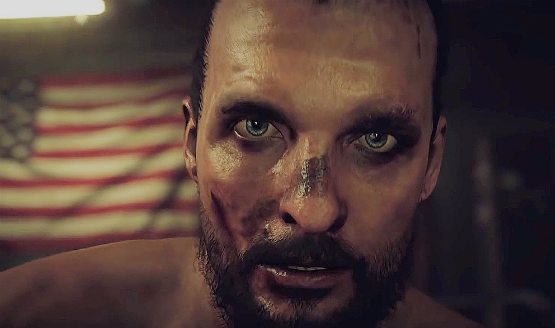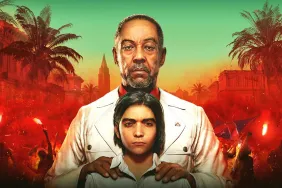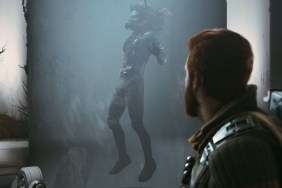This piece contains spoilers for Far Cry 4, Far Cry 5, Inside, and BioShock.
You don’t play Far Cry 5. Far Cry 5 plays you.
The idea of games forming control over their players isn’t new. One game in particular explored players’ willingness to simply hit the next objective marker: BioShock. The “would you kindly” revelation at the conclusion of BioShock is one of the moments I wish I could go back and experience for the first time all over again. In that moment, the player realizes every action that they’ve taken during the game hasn’t been by their choice. They played right into Andrew Ryan’s–and the developer’s–hands.
In fact, by following objective markers on a screen, that’s often what we’re objectively doing. As much as we play games, games often play us right back. Indie darling Inside’s entire narrative centers on a prefabricated control of the player. Whether it’s a trophy hunter tracking down every last collectible for little more than a bit of virtual satisfaction, or if you’re just one to run to the next objective marker because it’s where the game told you to go, you are at the mercy of the developers. The people who created the game are playing you. Nathan Drake, Ratchet and Clank, Lara Croft, Master Chief. Every one of their journeys is a massive series of “would you kindlys” from the developers. Would you kindly complete this shootout? Would you kindly retrieve this item? Would you kindly proceed to the end of this level? And you do, because the only other choice is putting the game down and not playing.
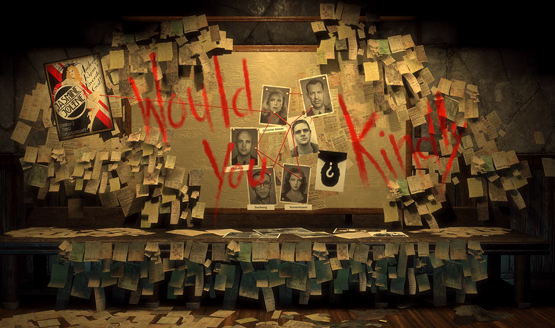
Far Cry 4 poked fun at the idea of gamers always charging forward, feeling required to take action. Near the beginning of the game, the player is asked to do nothing and wait for Pagan Min to return. Ignoring this and charging into action like any gamer is conditioned to do will set the events of the game in motion. Obeying Min’s request and actually waiting around for 13 minutes concludes the game and reveals the mystery that draws players through for the duration of the narrative. Ajay is allowed to lay his mother’s ashes to rest next to Lakshmana, his half-sister. Mystery solved. Objective complete. Sure, Min is still in control, but was that really your problem to deal with?
On the other hand, you can actually choose a game full of action, shooting, and killing. If you kill Pagan Min at the end, Ajay never finds out that Lakshmana is referring to his half-sister. And even by overthrowing Min, your “allies” continue tyrannical leadership, simply applying their own harsh styles were Min left off. The land is left in effectively the same position as where you started, and you could have done nothing and completed the game in just over 15 minutes.
Why Far Cry 5’s Secret Ending Means More Than You Think
Those expecting a similar ending for Far Cry 5 were right, but at first glance it seems disappointing. When asked to slap the cuffs on Joseph Seed, you can refuse. After about a minute, you walk out of the church with the rest of the law enforcement officers. There’s no big revelation. No twist to show off the ending of the game. Just inaction that prevents you as the player from getting wrapped up in The Father’s shit. Hitting the real ending shows why this simple decision means a lot more than first glance might reveal.
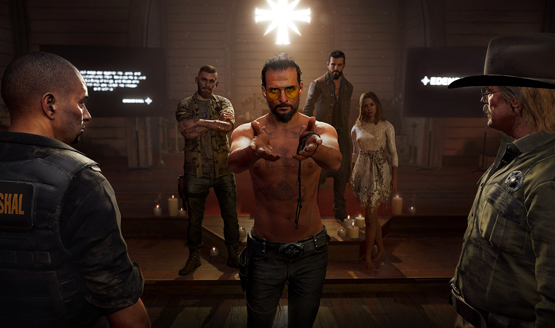
Where other games might put you in the role of a character with some kind of background or story to drive the motivation, there is no such background for your character in Far Cry 5. Pushing forward to the next goal is understandable from the perspective of Nathan Drake, Lara Croft, or even previous Far Cry protagonists. For the sake of perpetuating the narrative, it’s important to have that kind of background and character development, which was one of my biggest problems with Far Cry 5. You have to give me a reason to want to follow each “would you kindly” that the game throws my way.
Without looking closely at Far Cry 5, it’s easy to miss the subtleties of control that the developer establishes over the player. On the surface, it’s a fun little romp on across rural America. It’s got its dark sides. It’s got its light and bizarre sides. It’s even got a self-referential side. But it’s all ultimately meaningless. As the final Far Cry 5 ending shows, the real victory comes from not playing the game at all. No matter which option you choose in the end, it’s a lose-lose situation. You as the player can’t win. You’ll end up getting all of your friends killed, or you’ll kill them yourself. Check out how the end of the world plays out below. Seed takes you alive because he wants you to see and to suffer, knowing that you lost because you couldn’t resist taking action. There is no possible conclusion where Joseph Seed is arrested or killed. He wins in every single scenario.
How did we come to this moment? Our goal wasn’t to lose. It wasn’t for the world to end. It wasn’t for the kind people of Hope County to feel the pain of death by our own hand. We sought simply to bring down Seed’s bloodletting empire. And yet by our involvement as players, everything turned out for the worse. I looked back enviously on that initial secret ending. Whether Seed was a madman who set off his own collection of nukes on Hope County or the end of the world actually came, it doesn’t matter. He was right. Every step we took, every move we made, and every objective marker we faced was another step towards fulfilling that world-ending prophecy. We were playing the game to lose.
Every Game You’ve Played Conditioned You For This Moment
Far Cry 5 embraced those themes of player conditioning for the full game. They permeate the narrative. From the story touching on the conditioning of humanity to the control that the developer took over the player through preconditioned gamer cognitions, the game was all about control to an end. Just look at the Bliss. Bliss is a mind control drug, exerting sway over the strong and breaking the minds of the weak. It was the center of Joseph Seed’s cult ring because his cult was all about control. By pressing X to slap the cuffs on Joseph Seed, you the player set forth a chain of events that endeavored to control your every move. The irony of all of this is that it’s in one of the most free-roaming and open Far Cry games yet. The illusion of freedom is a myth though, a funnel leading to a singular conclusion and a failure of you as a player to actually accomplish the goal you set out to undertake.
Jacob Seed’s region, in particular, conditions the player for an obviously horrible outcome. Each time you are captured in his region, he forces you through the same shooting course again and again, until you can almost perform it with your eyes closed. Enemy on the stairs, blam. Enemy in the doorway, blam. Each one going down faster than the next. In one final run of the course, the faceless enemy at the end is replaced by an ally, someone who had been working against Eden’s Gate. You were so quick to take down all of the enemies over and over that you didn’t stop to think there might be a reason for his conditioning. Or maybe you did and you continued anyway, because that’s what the game wanted you to do. I mean, the only other option was game over, so did you really have a choice in doing anything but killing your friend?
All across Hope County, we keep doing innocuous things for no good reason other than it’s what the objective markers tell us to do. I wasn’t exactly keen on assisting the far-right father of Hurk Drubman, but I really had little choice in the matter. My character didn’t voice any discomfort in this decision either, because they had no voice. In games where the player character has a background and a voice, you are filling a role. Even when disagreeing with their actions, there’s a narrative line and character development to carry forward any decisions that they might make.
I was supposed to be the player character, so I spent time screaming in my own head that I disagreed with some of the things I was being asked to do. Yet my avatar smiles with complicity and carries on with each task. The player character has no choice, but I do. I can choose not to press X. I can choose to walk away. It might not make for the most fun game experience, but the choice doesn’t lie on the character. It lies on the player. And what did I do? “Would you kindly help Hurk Drubman Sr. get his truck back? Would you kindly collect bull testicles for our festival? Would you kindly kill your friends and end the world?” I did exactly what I was conditioned as a gamer and a reviewer to do.
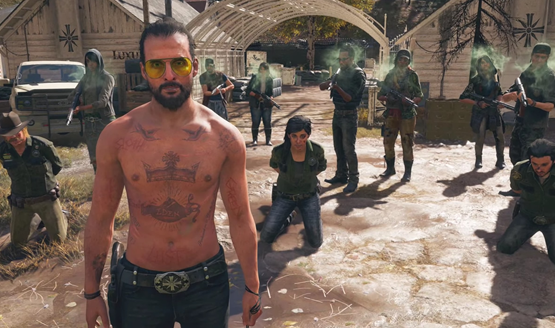
Every time we turn on our console, we march to the beat of a drum that is set for us. For all the things I disliked about Far Cry 5, those same elements come back to deliver a very meta message. Gamers have been conditioned to certain actions when often the very act of inaction could present itself as the right and most favorable answer. Whether an intentional decision by the developers, or a fluke that I happened to come across, Far Cry 5 feels like they took the idea from Far Cry 4’s secret ending and wove it into the entire narrative. The developer can’t know what you as a player have as driving motivations, but they know one thing. They know you are a gamer. They know you can’t resist another objective marker, even when your character has no known motivation to continue their journey. Far Cry 5 is Ubisoft’s Bliss, and if you completed the game, then it took hold of you and exerted its control.
I must be one of the mad ones. I’ve got a Platinum trophy to show for it.
Essential Reading
- Are We All Just High-Score Junkies?
- Shadow of War and Why Buying Games on Day One is Losing Its Charm
- Inside Secret Ending Explained
